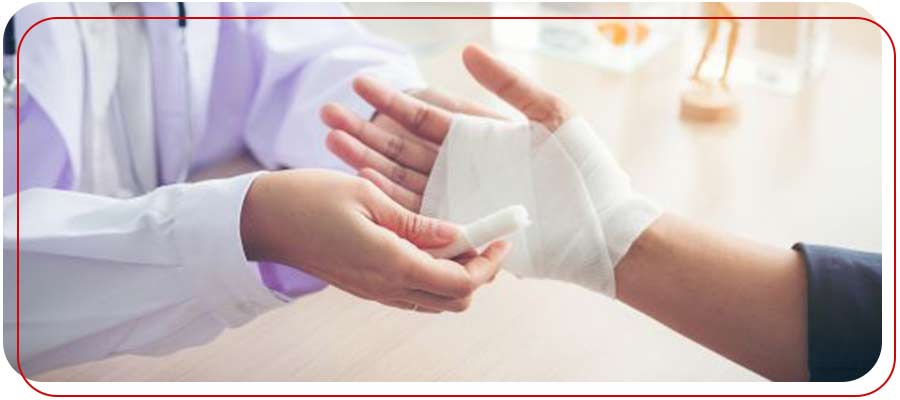What Is Wound Care and What to Expect During this Treatment Q&A
PrimeHealth Primary Care understands the complexity of wound care and its critical role in the healing process. Our devoted team applies appropriate medical techniques and personalized treatment programs that improve the body’s natural healing potential, resulting in shorter recovery times and higher quality of life for our patients. We are dedicated to providing comprehensive wound care services, and your well-being is our priority. Consult Dr. Alfonso Espinel, MD, and his team. For more information, please contact us or request an appointment online. We are conveniently located at 3014 53rd Ave East, Bradenton, FL 34203.


Table of Contents:
What are the 4 types of wounds?
What factors affect wound healing?
Do wounds heal faster covered or uncovered?
What is the correct way to care for a wound?
The first type of wound is a laceration, also known as a cut. This results from a sharp object like a knife or a piece of glass, penetrating the skin. Lacerations can vary in depth and length, and depending on the severity, may require stitches to aid in the healing process. The second type is an abrasion, commonly referred to as a scrape. This happens when the skin rubs against a rough surface, causing the outer layers of the skin to tear. Abrasions are generally minor and can be treated with basic first aid procedures such as cleaning and bandaging the wound. Thirdly, puncture wounds occur when a pointed object pierces the skin. Examples could include stepping on a nail or being bitten by an animal. Puncture wounds can be dangerous due to the risk of the injury being deeper than it appears on the surface and the potential for infection.
Lastly, we have avulsion wounds, which are severe and occur when a portion of the skin, and sometimes underlying tissue, is torn away. These types of wounds are often the result of violent incidents or accidents and require immediate medical attention due to the extensive damage they cause.
Several factors can impact the wound-healing process. Age is one significant factor, as the healing process tends to slow down in older individuals due to reduced skin elasticity and slower cell regeneration. Underlying health conditions, such as diabetes or circulatory issues, can also inhibit healing as they can affect blood flow and immune response. Nutrition plays a critical role, with adequate protein intake and hydration being essential for healing. Stress and smoking can negatively impact wound healing, while good personal hygiene can help prevent infection. Lastly, the size, depth, and location of the wound can influence the healing time, with larger or deeper wounds generally taking longer to heal.
Covering a wound is generally advised since it helps to create a moist environment that promotes healing and protects the wound from infection. When a wound is left uncovered, it can dry out and form a scab, which may slow down the healing process. However, it’s essential to remember that not all wounds are the same. Minor cuts and scrapes can sometimes benefit from exposure to air, which can help to dry and heal them. In contrast, larger or deeper wounds, or those in high-friction areas, often heal better when they are covered and protected. Always consult with a healthcare professional for guidance on wound care and follow their advice.
The correct way to care for a wound begins with cleaning it properly to remove any dirt or debris, thereby reducing the risk of infection. This is usually done with mild soap and water. Next, the wound should be covered with a sterile bandage or dressing, which helps to keep the wound moist and speeds up the healing process while also protecting it from further injury and bacteria. It is important to change the dressing regularly, especially if it becomes wet or dirty. If the wound is deep, continues to bleed, or shows signs of infection such as warmth, redness, swelling, or increased pain, seek immediate medical attention. Pain management, through over-the-counter medication or prescribed by a doctor, can support comfort during the healing process. It’s also important to maintain good nutrition, stay hydrated, and avoid smoking as these factors can influence wound healing. Always follow the advice of a healthcare professional when it comes to wound care.
At PrimeHealth Primary Care, we’re here to guide you through your wound-healing journey. Our dedicated team is ready to provide high-quality care, tailored to your specific needs. For more information on our wound care services or to schedule your appointment, don’t hesitate to give us a call. You also have the option to conveniently schedule an appointment online. We are conveniently located at 3014 53rd Ave East, Bradenton, FL 34203. We serve patients from Bradenton FL, Ellenton FL, Palmetto FL, Rubonia FL, Foxleigh FL, and West Samoset FL.

Additional Services You May Need
• Physical Exam
• Wound Care
• Sports and School Physicals
• Lab Tests
• Primary Care
• Immunizations
• X-Ray
• Blood Testing
• Chronic Care
• Diabetes
• Skin Conditions
• Procedures
• STD Testing
• Telemedicine
• Covid Testing
• Occupational Medicine
• Corticosteroid Joint Injections
• Anterior Nasal Packing
• Eye Irrigation for Chemical Exposures
• EpiPen Administration and Monitoring
• Oxygen Administration
• Breathing Treatments
• Blood Draws and Basic Lab Tests
• ECG Interpretation
• Laceration Repair
• Incision and Drainage (I&D) of Abscesses
• Foreign Body Removal
• Burn Care
• Wound Debridement
• Nail Trephination
• Ingrown Toenail Removal
• Skin Tag Removal
• Skin Wart Removal
• Steri-Strip and Skin Adhesive
• Splinting for Minor Fractures or Sprains
• Joint Aspiration for Pain Relief or Diagnostic Purposes
• Dislocation Treatment
• Crutch Fitting and Gait Training
• Cerumen (Earwax) Removal
• Eye Foreign Body Removal
• Hemorrhoid Care (Non-Surgical)
• Nebulizer Treatments
• Abscess Drainage
• Skin Glue Application
• IV Placement and Fluid Administration
• Rapid Diagnostic Testing
• Tetanus/Diphtheria Vaccination

Additional Services You May Need
• Physical Exam
• Wound Care
• Sports and School Physicals
• Lab Tests
• Primary Care
• Immunizations
• X-Ray
• Blood Testing
• Chronic Care
• Diabetes
• Skin Conditions
• Procedures
• STD Testing
• Telemedicine
• Covid Testing
• Occupational Medicine
• Incision and Drainage (I&D) of Abscesses
• Laceration Repair
• Foreign Body Removal
• Burn Care
• Wound Debridement
• Nail Trephination
• Ingrown Toenail Removal
• Skin Tag Removal
• Skin Wart Removal
• Steri-Strip and Skin Adhesive
• Splinting for Minor Fractures or Sprains
• Joint Aspiration for Pain Relief or Diagnostic Purposes
• Dislocation Treatment
• Crutch Fitting and Gait Training
• Corticosteroid Joint Injections
• Cerumen (Earwax) Removal
• Anterior Nasal Packing
• Eye Foreign Body Removal
• Eye Irrigation for Chemical Exposures
• Hemorrhoid Care (Non-Surgical)
• Nebulizer Treatments
• EpiPen Administration and Monitoring
• Oxygen Administration
• Breathing Treatments
• Abscess Drainage
• Skin Glue Application
• IV Placement and Fluid Administration
• Blood Draws and Basic Lab Tests
• Rapid Diagnostic Testing
• ECG Interpretation
• Tetanus/Diphtheria Vaccination






